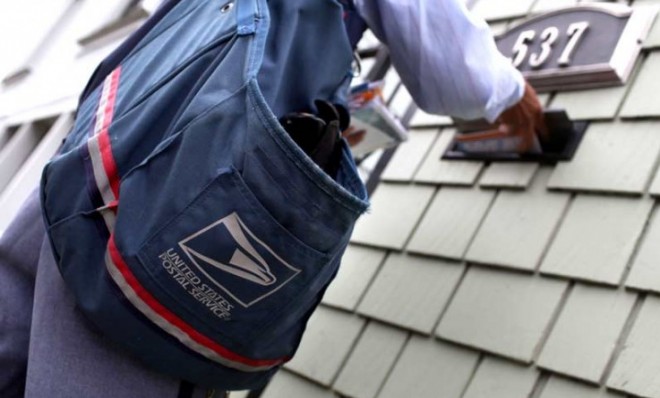No mail on Saturday: Will five-day-a-week delivery save the U.S. Postal Service?
Starting in August, the USPS will deliver only packages on Saturday. Is the $2 billion in savings worth it?


A free daily email with the biggest news stories of the day – and the best features from TheWeek.com
You are now subscribed
Your newsletter sign-up was successful
Say goodbye to mail delivery on Saturday, America. Starting Aug. 1, the financially struggling U.S. Postal Service, for the first time in 150 years, will not show up at your house or business on Saturdays unless you are receiving a package, express mail, or Priority Mail. The move "accentuates one of the agency's strong points," says the AP's Pauline Jelinek: While snail mail delivery has steadily declined in the age of email and Facebook, "package delivery has increased by 14 percent since 2010."
The change, "debated ad nauseum for months and months," will save the Postal Service $2 billion a year, says Patrick Rizzo at NBC News. That sounds like a lot, until you realize the USPS posted a record $15.9 billion loss in the last fiscal year, driven by $11.1 billion in pre-funded future retirement costs. "We are currently losing $25 million per day," Postmaster General Patrick Donahoe warned in January.
There is a potential hitch to the new plan, Rizzo says: The USPS, while an independent federal agency that receives no tax dollars, is still "subject to congressional control, and congressional foot-dragging." So it's not clear how it will convince Congress to finally sign off on five-day-a-week delivery, or if it has found a workaround.
The Week
Escape your echo chamber. Get the facts behind the news, plus analysis from multiple perspectives.

Sign up for The Week's Free Newsletters
From our morning news briefing to a weekly Good News Newsletter, get the best of The Week delivered directly to your inbox.
From our morning news briefing to a weekly Good News Newsletter, get the best of The Week delivered directly to your inbox.
Among those who don't think this will save the USPS: Hallmark, the greeting card giant that "really wants you to be able to open that birthday card on a Saturday," says Catherine Ho at The Washington Post. Hallmark is putting some serious cash toward lobbying Congress to make sure the change doesn't happen. "Solving budget shortfalls through price increases and reduction of service not only won't work, it will make matters worse," Hallmark CEO Don Hall Jr. once argued. "I am concerned that going down this path does not address the critical issues and we will soon be talking about four-day or three-day delivery."
Of course, not everyone agrees. Cutting Saturday service is the least the USPS can do, says David Walker at Reuters. Like the federal government, the Postal Service is in dire need of a major overhaul, and it has been for more than a decade. The problems start with the fact that the venerable agency's "business model was designed for an era before the internet and many other means of expedited physical delivery (FedEx, UPS, DHL)." We have to consider not just service cuts but outsourcing the delivery of mail from post office to home.
My advice: Stock up on "forever" stamps.... If the USPS doesn't get its act together, we're likely to see far higher prices in the future. Though there are now limits on postage increases, the related financial math doesn’t come close to working over time. The Postal Service is in trouble. The agency is bleeding red ink; has hit its authorized borrowing limit with the Treasury; and is unable to make its scheduled retirement funding contributions. Something has to give — and must this year. [Reuters]
The USPS is also "one of the largest commercial property operations in the country," says The Washington Examiner, so maybe it could sell off some unused land to erase some of that red ink.
Actually, says Fredric Rolando in Indiana's South Bend Tribune, nothing can solve the fiscal "gloom-and-doom picture" of America's "most trusted federal agency" but the entity that created all the red ink: Congress. And doing so won't involve service cuts. In 2006, Congress foolishly "mandated that the Postal Service do something no other agency or company has to do — pre-fund future retiree health benefits," and at a "highly aggressive level." The USPS had to finance the next 75 years of benefits within a decade. Strip away that anchor and the Postal Service's "financial performance has been admirable."
A free daily email with the biggest news stories of the day – and the best features from TheWeek.com
The USPS provides the world's most affordable delivery service. It's rooted in the Constitution. It unites this vast land. It anchors a $1.3 trillion mailing industry employing 7.5 million private-sector Americans.... It's critical to small businesses open weekends and needing to send and receive financial documents.... For 200 years, the Postal Service has faced technological innovations such as the telephone, fax machine, or telegraph, emerging stronger each time. If lawmakers address the pre-funding fiasco — rather than reducing services to Americans and their businesses — it can do so once again. [South Bend Tribune]
Peter has worked as a news and culture writer and editor at The Week since the site's launch in 2008. He covers politics, world affairs, religion and cultural currents. His journalism career began as a copy editor at a financial newswire and has included editorial positions at The New York Times Magazine, Facts on File, and Oregon State University.
-
 ‘Restaurateurs have become millionaires’
‘Restaurateurs have become millionaires’Instant Opinion Opinion, comment and editorials of the day
-
 Earth is rapidly approaching a ‘hothouse’ trajectory of warming
Earth is rapidly approaching a ‘hothouse’ trajectory of warmingThe explainer It may become impossible to fix
-
 Health insurance: Premiums soar as ACA subsidies end
Health insurance: Premiums soar as ACA subsidies endFeature 1.4 million people have dropped coverage
